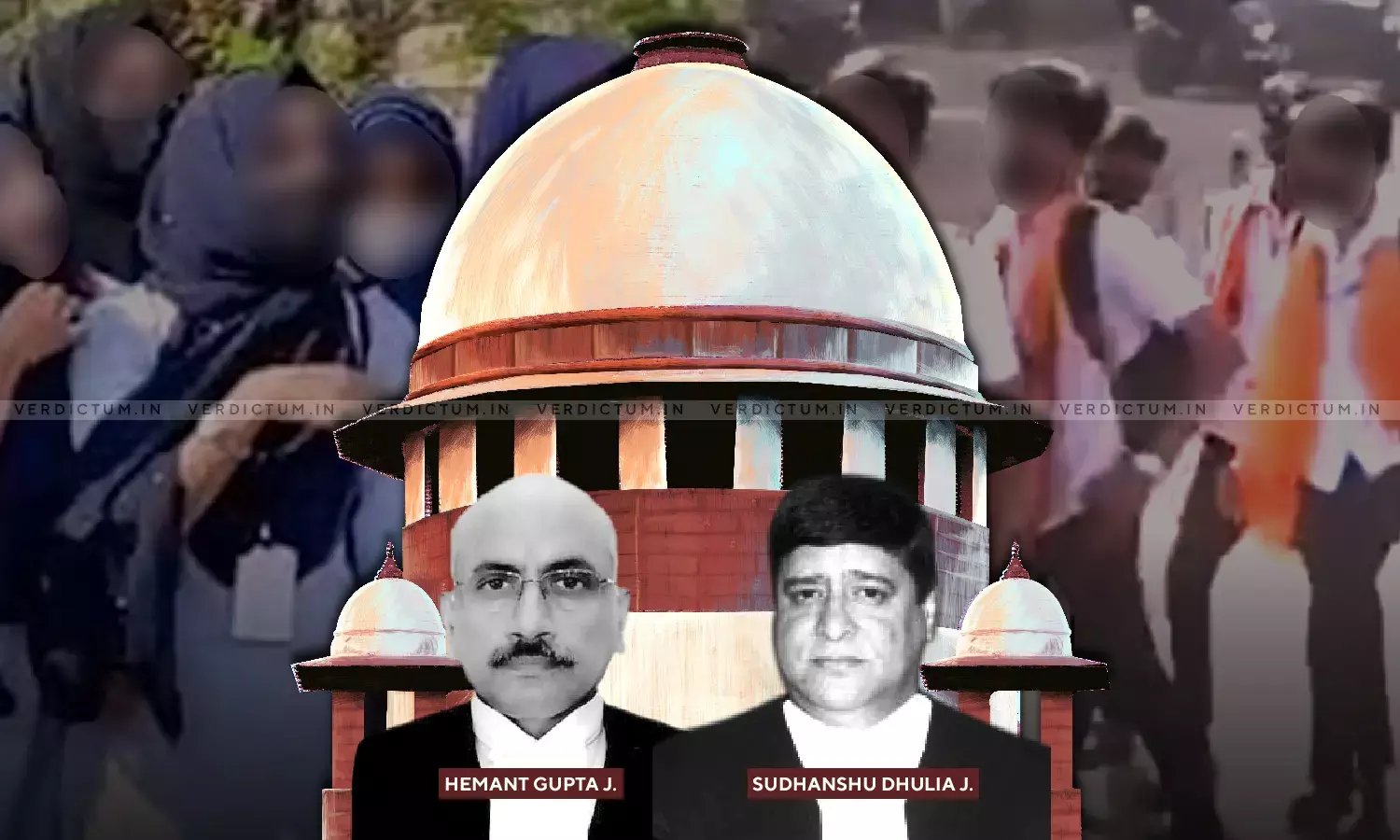There Is No Binary Of Obligatory And Non-Obligatory In Islam- Salman Khurshid Completes His Arguments In Hijab Appeals

The Supreme Court has concluded the 4th day of hearing of the pleas challenging the Karnataka High Court's Judgment upholding the restriction imposed by the state on the wearing of Hijab in government schools.
The Bench of Justice Hemant Gupta and Justice Sudhanshu Dhulia said that it will continue with the hearing starting at 11 or 11.30 am on Wednesday, when Senior Advocate Huzefa Ahmadi for some of the Appellants will begin his arguments.
Senior Advocate Yusuf Muchchala for some of the Appellants finished his arguments today. He commenced his arguments with the submission that though there was pleading about the students wearing Hijab for several years, the High Court held that there were no pleading about it.
He submitted that rights of the students under Articles 25(1), Article 19(1)(a) and 21, including the right to conscience, on a conjoint reading, have been violated. He read from a report of the Government for inclusive education of Muslim girls but clarified that it was not placed before the High Court.
Muchchala read from the Court's judgment in the Puttaswamy Case. He submitted that right to religious freedom and right to freedom of conscience are not mutually exclusive as held by the High Court but complement each other. He submitted that as an aspect of the right to privacy, the right to dress is part of decisional autonomy.
"Women who wear Hijab should not be caricatured, they must be looked upon with dignity. They are strong willed women who feel empowered by wearing Hijab", Muchachala submitted.
He submitted that the question of essential religious practice does not arise as far as an individual's rights are concerned. He submitted that the Court should not have ventured to interpret the Quran since that is not the area of expertise of the Court. Justice Dhulia responded by saying that it was the Appellants who went to the Court and called upon the High Court to interpret the holy book. Muchachala responded by saying that someone before the High Court did that erroneously in "enthusiasm". Justice Gupta then pointed out that there is a contradiction in his submission that the question of essential practice should be referred to the larger Bench and that the Courts cannot interpret a religious text.
Senior Advocate Salman Khurshid commenced his arguments by saying that Quran is the word of God as revealed through the Prophet and that "there is no binary of obligatory and non-obligatory in Islam".
Kurshid handed over a copy of the Quran. However, the Bench said that it would not like to keep the holy book. When Kurshid said that the book can be kept in the Judges' library, the Bench said that there is already a Quran in the Judges' library.
Kurshid also handed over pictorial representations to distinguish between a Burkha, Jilbab and a Hijab. He read extensively from the Judgment in the Puttaswamy Case.
"We would never say that the uniform be dispensed with, but if there is something in addition to the uniform, I would urge Your Lordships to permit it", Kurshid submitted.
He submitted that just like in the Golden Temple, where it is mandatory to cover the head, in Mosques in India they insist for covering the head though such a practice is absent in other parts of the world. He that its an Indian practice, influenced by other cultures in India.
With respect to the verse of the Quran which says that there is no compulsion in religion, he said that is to be read with the verse which says "to you your religion, to them theirs". He also said that Kafir is someone who denies the existence of any God.
He said that one of his clients is a Sikh lady and that this issue may arise in respect of them also. Kurshid completed his arguments.
On the previous hearing on Thursday, Senior Advocate Devadatt Kamat and Advocate Nizamuddin Pasha had concluded their arguments.
During his arguments when Advocate Pasha had submitted that the Karnataka High Court's finding that some verses of the Quran have lost relevance borders on blasphemy and that God is the creator of time and that the verses of the Quran are relevant for all times to come, Justice Dhulia had responded to the blasphemy remark by saying "Don't go that far".

